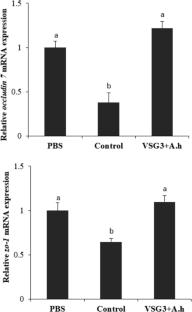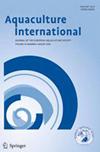Enhancing mucosal immunity in Cyprinus carpio using Lactiplantibacillus plantarum as a probiotic supplement
Abstract
The diet of Cyprinus carpio was supplemented with Lactiplantibacillus plantarum VSG3 at 108 colony-forming units (CFU)/g for 60 days. The effects on C. carpio skin and intestinal mucus were investigated, focusing on various enzymatic and immune parameters. Dietary VSG3 administration increased the levels of total protein in the serum and the skin and intestinal mucus; the immunoglobulin M levels were increased (P < 0.05) in skin mucus. Dietary VSG3 administration increased the superoxide dismutase and catalase activities in the skin and intestinal mucus. The ceruloplasmin and nitric oxide levels were not affected by feeding VSG3. The lysozyme and peroxidase activities were considerably higher in the intestinal and skin mucus in the treated fish. The il-1β and tnf-α expression levels were downregulated, and the transcription levels of tight junction genes occludin, occludin 7, and zo-1 as well as those of the adaptor protein myd88 were upregulated in the intestine after being fed VSG3. The fish were challenged with Aeromonas hydrophila after 60 days of feeding VSG3. These genes in the intestinal tissues of the challenged fish were analyzed. The dietary VSG3 administration reversed the A. hydrophila-induced changes in the expressions of these genes and of il-10. Administering VSG3 through the diet may strengthen mucosal defense mechanisms by affecting various immunological aspects of the skin and intestinal mucus. VSG3 strengthens the intestinal epithelial barrier in fish. Overall, these results highlight the potential of using L. plantarum VSG3 as a dietary supplement for boosting the immune responses of carp.


 求助内容:
求助内容: 应助结果提醒方式:
应助结果提醒方式:


